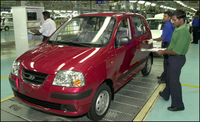Hyundai Motor Moves Closer to No. 1 in India
SEOUL - September 17, 2006: Kim Yon-se writing fore the Korea Times reportred that Hyundai Motor plans to invest about $500 million in India by 2008 to overtake Japan’s Suzuki, the No.1 foreign carmaker in the country.
Hyundai Motor officials say the annual output from its two factories _ the second one is under construction _ in India will grow to 400,000 units. The cars will be sold in India or exported to other countries.
The overseas plant’s combined vehicle sales were 252,851 in 2005, up 17.3 percent from a year earlier, in terms of consumers’ registration.
A Hyundai spokesman said, ``Aside from the local sales, the potential of our Indian plant lies in the fact that it is in charge of wide exports to countries in the West.’’
He said most of the cars produced in the two plants in India would be shipped to Europe, Latin America and the Middle East.
Cooperation between South Korea and India has grown steadily since the liberalization of the Indian economy in the early 1990s, and Hyundai Motor has become the No. 2 vehicle producer in the lucrative Southwest Asian market.
Last March, Hyundai Motor India rolled out its millionth passenger car.
In February, Chairman Chung Mong-koo unveiled a plan to build a second manufacturing plant in India by 2007 in response to growing demand for automobiles in the country. Chung said Hyundai would harness India as one of the key bases for its global production.
Hyundai has a plant in Chennai in the Tamil Nadu Province, which has an annual production capacity of 250,000 units.
It has decided to build a second car-manufacturing plant in India in response to a dramatic increase in the demand for automobiles.
During his meeting with employees of Hyundai’s first auto plant in Chennai in the Tamil Nadu Province, Hyundai Motor Chairman Chung Mong-koo said, ``India is a leader among the BRIC (Brazil, Russia, India and China) countries, and it is for this reason that Hyundai sees it as fit to identify it as the basis for its global production.’’
Noting that the Indian market has been growing at a rate of 12 percent per year, Chung said the output from the two plants will also be shipped to Europe, Latin America and the Middle East, among other locations.
Hyundai Motor India is constructing the second manufacturing plant on a 2.15 million square meter lot for completion in 2007.
With the second plant, Hyundai Motor will take another step toward establishing a global production network with other operations in China, Turkey and the United States.
The expansion plan is taking place as other leading multinationals, including General Motors and Toyota, move swiftly to increase production there.
Hyundai has had a stellar performance in India, having reached 500,000 units in sales since the introduction of the mini-car Santro in September 1998.
The India plant produces six models _ the Sonata, Tucson, Terracan, Avante XD (branded Elantra there), Atoz Prime (branded Santro) and Click (branded Getz).
Summit between India and Korea
Office of Hyundai Motor India in New Delhi Cooperation between South Korea and India has grown steadily since the early 1990s. Since President Roh Moo-hyun attended the Indian summit in October 2004, bilateral economic trade volume has increased.
India’s president A.P.J. Abdul Kalam reciprocated by visiting Seoul last February.
In his visit, President Roh developed comprehensive agreements in about 30 areas, especially in economic cooperation with India, one of the four emerging economies called BRICs nations. The agreements included a target of $10 billion in bilateral trade by 2008.
Roh and Indian Prime Minister Manmohan Singh consented to launch feasibility studies on a free trade agreement as part of moves to achieve the trade goal and increase bilateral investment.
However, Korean companies have been pioneers in the Indian market since the mid-1990s, cultivating fruitful and comprehensive agreements, ranging from politics to culture and economy.
Hyundai has led South Korean companies’ move since it established its wholly owned Indian subsidiary, Hyundai Motor India, in 1996.
Its Chennai plant, constructed with an investment of 900 billion won on grounds of 2.15 million square meters, is capable of rolling out 250,000 units per annum after an expansion this year.
Hyundai Motor India was set up by 100 percent investment of Hyundai Motor, in order for the company to swiftly and positively adjust to changes in market conditions, company officials said.
The plant is self-sufficient. A full range of manufacturing lines and research facilities, including the press shop, assembly lines, paint shop and test-driving areas, are in operation.
Moreover, the plant plays a significant role in the regional economy, as 2,700 employees are hired there and only 58 are dispatched from Seoul.
``Located at Irrunattukottia, near Chennai, Hyundai Motor India has contributed to the regional economy by helping co-develop one of India’s largest automotive manufacturing zones, supported by over 25 Indo-Korean joint-venture partners and original equipment vendors, jointly employing over 10,000 people,’’ a Hyundai official said.
As part of its community development projects, the company has adopted a few villages around its factory and has been working towards the social and economic development of these villages, assisting them with primary health care, education, basic amenities and employment opportunities.
The automaker is also focusing on improving its relationship with the Indian public.
For instance, the company, along with the India Today group, has organized the Music Fest every October for three consecutive years.



